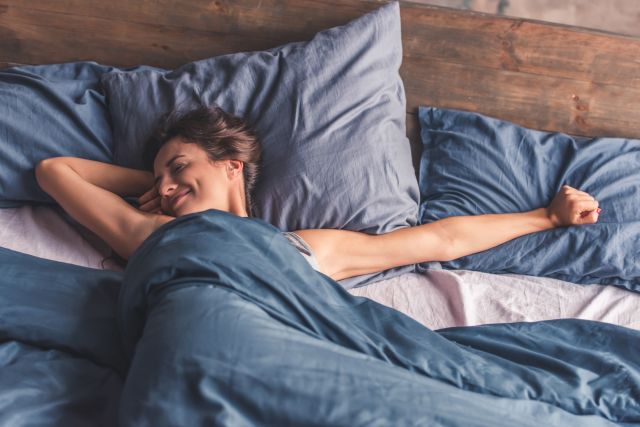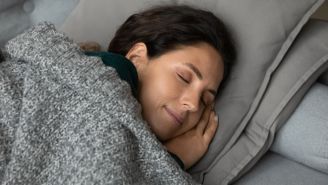Updated on February 8, 2023.
It’s no secret that getting quality shut-eye does more than just keep you from feeling groggy. Sleep is essential for health and well-being, linked to reduced anxiety levels and enhanced memory plus a lower risk of depression, obesity, heart disease, and diabetes.
Ideally, adults 18 to 60 years old should get seven or more hours of sleep per night, according to the Centers for Disease Control and Prevention. People ages 61 to 64 could benefit from seven to nine hours nightly, and those ages 65 and up should sleep seven to eight hours.
If getting enough sleep is a constant challenge, however, these strategies can help boost your chances of success.
Drop excess pounds
If you are carrying extra weight, losing a few pounds may help you sleep better, suggests a 2021 study published in the International Journal of Obesity. For the study, researchers looked at 151 overweight or obese people undergoing a behavioral weight loss program, and found that weight loss was linked to better sleep health. It was also associated with improved aspects of sleep quality, like regularly waking at the same time each day and sleep satisfaction.
For those looking to lose excess weight, start by adopting a healthy diet that is rich in fruits, vegetables, whole grains, and lean protein—and by getting more physical activity. Speaking of fitness…
Sweat it out
Regular exercise may actually help you sleep better. It may also help with issues like sleep apnea and difficulty dozing off.
In a large 2021 review of studies published in Sleep Medicine Reviews, researchers noticed that the longer the exercise, the better the sleep. But you don't have to be a frequent gym-goer to reap some perks. Though evidence suggests getting regular pyhsical activity imparts the greatest benefits, even a lighter workout, like a 10-minute walk, can help improve sleep quality.
Optimize your routine
To improve your sleep hygiene, try these simple steps before crawling into bed:
- Try going to bed and waking up at the same time each day, even on weekends.
- Keep tablets, phones, laptops, and televisions turned off or out of the bedroom entirely.
- Make your bedroom cool, dark, and quiet.
- In the hours before bedtime, steer clear of caffeine, alcohol, and foods that might disrupt sleep. It’s best to stop drinking caffeinated beverages like coffee by mid-afternoon.
Stay in the moment
If you’ve had so-so success with sleep hygiene, a few minutes of meditation might help. For some people, practicing mindfulness—bringing one’s attention to the sensations of the present moment—can help bring on sweet dreams.
A 2020 study published in Sleep Health found that practicing mindfulness meditation improved reported sleep quality and daytime function, due to being more rested. And a 2022 review published in the International Journal of Environmental Research and Public Health linked mindfulness-based movement practices like yoga and Tai Chi Chuan to better sleep quality, especially when done twice a week for more than three months.
So, carve a few minutes out of your day to practice mindfulness. Try sitting quietly or doing some basic yoga poses. Take note of the feeling of your breath moving in and out of your body and the sights and sounds around you. Notice subtle sensations, like an itch, or the breeze on your skin.
Find your purpose
Cultivating a sense of purpose may help you get better sleep, too. For one 2017 study published in Sleep Science and Practice, researchers gathered survey data from 825 adults with an average age of 79. They found that participants who believed their lives had meaning were less likely to have conditions like sleep apnea and restless leg syndrome, and more likely to have higher quality sleep.
Similarly, a 2020 study published in Preventive Medicine looked at almost 14,000 older adults over eight years and found that those who felt a strong life purpose were 33 percent less likely to develop sleep problems.
How do you find your sense of purpose? Think about what you love to do most or set a goal you'd like to accomplish. A daily affirmation—whether you say it out loud or write it down—may help you define and attain your purpose.
Track your progress
Keeping track of your shut-eye can be as simple as downloading an application to your mobile device.
Free apps like Sharecare, available for iOS and Android, can automatically monitor your sleep each night and help pinpoint the sleep-promoting techniques that may work best for you. You can also manually log your hours slept, along with your meals and physical activity—all of which can work together to help you optimize your sleep-wake balance.







